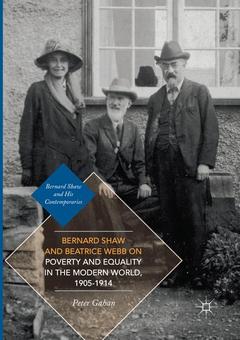Bernard Shaw and Beatrice Webb on Poverty and Equality in the Modern World, 1905–1914, 1st ed. 2017 Bernard Shaw and His Contemporaries Series
Auteur : Gahan Peter

This book investigates how, alongside Beatrice Webb?s ground-breaking pre-World War One anti-poverty campaigns, George Bernard Shaw helped launch the public debate about the relationship between equality, redistribution and democracy in a developed economy.
The ten years following his great 1905 play on poverty Major Barbara present a puzzle to Shaw scholars, who have hitherto failed to appreciate both the centrality of the idea of equality in major plays like Getting Married, Misalliance, and Pygmalion, and to understand that his major political work, 1928?s The Intelligent Woman?s Guide to Socialism and Capitalism had its roots in this period before the Great War. As both the era?s leading dramatist and leader of the Fabian Society, Shaw proposed his radical postulate of equal incomes as a solution to those twin scourges of a modern industrial society: poverty and inequality. Set against the backdrop of Beatrice Webb?s famous Minority Report of the Royal Commission on the Poor Law 1905-1909 ? a publication which led to grass-roots campaigns against destitution and eventually the Welfare State ? this book considers how Shaw worked with Fabian colleagues, Sidney and Beatrice Webb, and H. G. Wells to explore through a series of major lectures, prefaces and plays, the social, economic, political, and even religious implications of human equality as the basis for modern democracy.
Date de parution : 06-2018
Ouvrage de 219 p.
14.8x21 cm
Date de parution : 03-2017
Ouvrage de 219 p.
14.8x21 cm
Thèmes de Bernard Shaw and Beatrice Webb on Poverty and Equality... :
Mots-clés :
Minority Report; The Prevention of Destitution; Fabian society; urban poverty; social inequality; social activism; social reform; industrial democracy; economic equality; gender equality; political literature; welfare state; H.G; Wells; Man and Superman; Major Barbara; Pygmalion; Charlotte Shaw; New Statesman; twentieth-century society; British and Irish Literature



